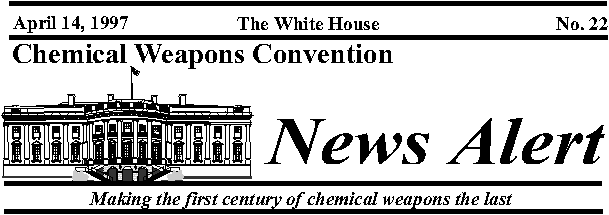|
2. “Would you support the treaty ... if it would result in the transfer of technology
that could help countries like Iran, Cuba or China increase their ability to fight
chemical wars?”
It would be strange if a treaty expressly devoted to eliminating chemical weapons and to
making their production, acquisition and trade more difficult resulted in the transfer of
chemical weapons technology to its parties. The CWC does just the opposite. It absolutely
prohibits helping any country make chemical weapons. The treaty reads: “Each
Party ... undertakes never under any circumstances to develop, produce, otherwise
acquire, stockpile or retain chemical weapons, or transfer, directly or indirectly,
chemical weapons to anyone. Each State Party shall adopt the necessary measures to
ensure that toxic chemicals and their precursors are only developed, produced, otherwise
acquired, retained, transferred or used within its territory ... for purposes not prohibited
under this Convention.”
The question seeks to further a fiction by treaty opponents about technology transfer
which is based on a misreading of language in the treaty: “... States Parties shall
facilitate ... and have the right to participate in ... exchange of chemicals, equipment,
and ... information relating to ... chemistry.” This provision is explicitly restricted
to exchanges for “purposes not prohibited under the Convention.” It merely affirms the
right of parties to engage in chemical commerce for peaceful purposes (e.g. industrial,
agricultural, research, pharmaceutical, medical or other pursuits) as they do today
without the CWC. A state party with chemical weapons aspirations has no right under the
treaty to anything that furthers those aspirations and no state party has an obligation
under the treaty to facilitate the transfer of chemical weapons technology -- the facts
are exactly the contrary. And nothing in the treaty requires the elimination of American
export controls on chemical materials or equipment.
|
3. “Would you support the treaty ... if countries that violated its prohibitions went
unpunished?”
Well no -- and neither would the Clinton Administration, every Chairman of the Joint
Chiefs of Staff since 1976, former President Bush, former Secretary of State James
Baker, former National Security Adviser Brent Scowcroft and former chiefs from every
branch of the military who now support the treaty.
Indeed, the question underscores why it is so vital that the United States ratify the
treaty. If we do not, Americans will not be able to help enforce the rules we helped to
write. Americans will not be allowed to serve on the treaty governing board. Americans
will not be allowed to lead or take part in inspection teams. And we will have no
standing -- legal or moral -- to ensure that when violations of the treaty are discovered,
they are punished.
With the treaty, if the United States detects illegal chemical production or trade by a
party, it can help rally international support for any number of multilateral actions,
including even military action, to halt such illicit activities. And of course, we retain
the right to act unilaterally. With the United States as a vigilant and vigorous member,
the CWC gives us more tools to prevent, stop or punish those who would produce or acquire
chemical weapons.
4. “Would you support the treaty ... if it would authorize UN inspectors to go to any
site in the United States; potentially without legal search warrants and potentially
risking American business or military secrets?”
The bias of this question is immediately evident by its erroneous assertion that “UN”
inspectors would be involved in inspections. The United Nations will have no role in
implementing the Chemical Weapons Convention. Rather, the treaty will be implemented by
inspectors and others from the countries which have ratified the Convention.
|


